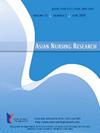使用移动即时通讯工具为腹膜透析患者定制饮食教育计划的效果:可行性测试。
IF 2.3
3区 医学
Q2 NURSING
引用次数: 0
摘要
目的:本研究旨在利用移动即时通讯工具为腹膜透析(PD)患者量身定制饮食教育计划。我们的目标是研究该项目对饮食相关自我效能、饮食自我护理依从性和生理指标(血红蛋白、白蛋白、钾和磷)的影响:这是一项准实验研究,采用了非等效对照组的前测-后测设计。我们采用了客户健康行为的 Cox 交互模型。共有 43 名患者(实验组 21 人,对照组 22 人)在三家医院的肾脏门诊就诊并接受了腹膜透析治疗。实验组使用移动即时通讯工具接受了为期五周的定制饮食教育计划。对照组患者接受常规护理。本研究按照以下顺序进行:前测试、治疗、后测试 1(紧接着)和后测试 2(四周后):研究结果表明,在不同时间和组别的交互作用下,饮食自我护理依从性(F = 15.29,p < .001)和血红蛋白水平(F = 7.55,p = .001)存在明显差异:饮食教育计划是预防并发症和帮助帕金森氏症患者进行饮食自我护理的有效策略,通过与帕金森氏症患者管理专家的教育护士进行系统和持续的互动,可以帮助帕金森氏症患者进行饮食自我护理。本文章由计算机程序翻译,如有差异,请以英文原文为准。
Effects of a Customized Diet Education Program Using a Mobile Instant Messenger for People Undergoing Peritoneal Dialysis: A Feasibility Test
Purpose
The study was conducted to develop a customized diet education program using mobile instant messenger for people undergoing peritoneal dialysis (PD). Our goal was to examine the program's effects on diet-related self-efficacy, dietary self-care compliance, and physiological indices (hemoglobin, albumin, potassium, and phosphorus).
Methods
This was a quasi-experimental study with a non-equivalent control group pre-post-test design. We applied the Cox interaction model of client health behaviors. Overall, 43 patients (21 in the experimental group and 22 in the control group) attending the renal clinic and undergoing PD at three hospitals were included. The experimental group underwent a customized diet education program using a mobile instant messenger for five weeks. Patients in the control group received routine care. This study was conducted in the following order: pre-test, treatment, post-test 1 (immediately after), and post-test 2 (four weeks after).
Results
This study showed significant differences in dietary self-care compliance (F = 15.29, p < .001) and hemoglobin level (F = 7.55, p = .001) in interactions between times and groups.
Conclusion
The diet education program is an effective strategies to preventing complications and helping PD patients perform dietary self-care compliance through systematic and continuous interactions with educational nurse who is an expert in PD management of people undergoing PD.
求助全文
通过发布文献求助,成功后即可免费获取论文全文。
去求助
来源期刊

Asian Nursing Research
NURSING-
CiteScore
4.20
自引率
4.50%
发文量
32
审稿时长
45 days
期刊介绍:
Asian Nursing Research is the official peer-reviewed research journal of the Korean Society of Nursing Science, and is devoted to publication of a wide range of research that will contribute to the body of nursing science and inform the practice of nursing, nursing education, administration, and history, on health issues relevant to nursing, and on the testing of research findings in practice.
 求助内容:
求助内容: 应助结果提醒方式:
应助结果提醒方式:


